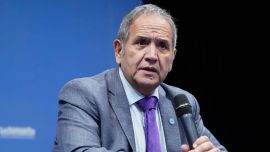Last Sunday, Alberto Fernández succeeded in beating off the surprisingly strong challenge mounted by Mauricio Macri in the final weeks of the campaign when huge crowds, reminiscent of those that had carried Raúl Alfonsín to a famous victory over his Peronist rival in 1983, gathered to applaud his every word. But, as Cristina Fernández de Kirchner made clear immediately after the bulk of the votes had been counted, this does not mean he can soon get down to running the country as he sees fit.
In the celebrations Cristina staged in Chacarita, the president-elect found himself getting treated as a bit player obliged to play second fiddle, not only to her but also to her current favourite, Buenos Aires Province’s next governor, Axel Kiciloff, who took advantage of the opportunity she gave him to deliver a thuggish harangue, in which he thundered against Macri and María Eugenia Vidal for just about everything they had done while in office.
Kiciloff’s belligerence disturbed the many who had expected the incoming government to adopt a conciliatory approach towards its political adversaries as, indeed, did the cold-shouldering by the Kirchnerite faithful of the man who had just won the presidential elections. The last thing the country needs right now is another gang war between Peronist factions.
Alberto Fernández reacted calmly to Cristina’s evident determination to remind him he was her puppet and should behave as such, but he did not waste much time before showing her he has a mind of his own. After a meeting with Macri in which the two of them agreed to make the handover of power as smooth and courteous as possible (unlike what happened four years earlier when Cristina boycotted the proceedings in order to avoid having anything to do with her “neoliberal” successor), he joined a bevy of Peronist provincial governors, town mayors and trade union bosses in Tucumán. It was his way of telling her and her cronies it is among such people that the real power lies and she had better get used to it.
Before joining forces with Cristina, Fernández had spent years attacking her from every conceivable angle. He let it be known he thought her an incompetent nutcase. Equalling scathing about Cristina’s personality and conduct of affairs had been Sergio Massa, another member of the coalition which won slightly less than half the votes in Sunday’s elections. Though both, along with many who campaigned alongside them, are notoriously slippery customers, it is reasonable to assume that they still hew to the ideas they expressed when they took it for granted Cristina was done for.
This raises a key question: who is using whom? It certainly made sense for Cristina to let herself be represented by an individual who had the reputation of being a pragmatic down-to-earth moderate and would therefore be able to win over many who disliked her often arrogant and authoritarian behaviour but also wanted to see Macri booted out. In turn, Fernández, Massa and other Peronist politicos must have been well aware that they could do with the millions of votes Cristina would be able to give them. Up to now, the deal has worked for both sides, but the differences between them are so great it will have to be renegotiated.
Fernández got where he is thanks to the people scraping a living in the Buenos Aires Province slum belt who see Cristina as a reincarnation of Evita Perón. Had it not been for them and their counterparts in the rest of the country, Macri would have held onto power despite his inability to put an end to the appalling economic crisis that is devouring the country.
However, while Cristina, Kiciloff and their devotees – who enjoy the support of Jorge Bergoglio, AKA Pope Francis – are more interested in exploiting the plight of the poor in order to ram through a populist revolution than in trying to make people’s lives a bit better, Peronist “moderates” want Argentina to develop as have many other countries which until fairly recently were sunk in poverty. Unlike some fervent Kirchnerites, they have no desire to see Argentina share the fate of Venezuela or Cuba, exciting as such a prospect may be for activists who dream of striking blows against capitalism.
While electioneering, Fernández kept saying that in his view Macri’s economic policies had been utterly wrongheaded and it was thanks, entirely to them, that the country ran the risk of suffering a catastrophe similar to that of December 2001 and much of 2002. But if the hints coming from his aides are anything to go by, he has no intention of making any radical changes once he is ensconced in the Pink House.Unfortunately for him and for other Peronists who for months had been telling the electorate that, for vile neoliberal reasons, Macri wanted inflation to pick up steam, production to sag and consumption, along with incomes, to nosedive, which is why the economy is in such a terrible shape, he must now face that disagreeable fact that the available options are far fewer than he had previously imagined.
Hemmed in by the circumstances, Fernández will probably choose between a friendlier version of Macri’s original “gradualism,” which like it would at most merely delay a head-on collision with reality, and drastically reducing public-sector spending in the hope that, after some months of great hardship that would be almost certain to set off “social explosions” every bit as violent as the one taking place next door in Chile, where the overall situation is far better than it is here, the economy would at long last start moving ahead again.
Of course, if he thinks such alternatives are too grim to be even contemplated, he could always do what dyed-in-the-wool Kirchnerites want, which is to forget about managing the economy in a realistic fashion and, as the Venezuelan Chavistas and the Cuban Castroites have done, tell the common folk they are fighting a holy war against neoliberalism, capitalism, orthodoxy or whatever you want to call it.
However, if his past is anything to go by, Alberto Fernández is not
cut out to be a glamorous revolutionary caudillo. For good or ill, he is
simply a middle-of-the-road politician who, just to survive, will need
all the help he can get.related news



















Comments